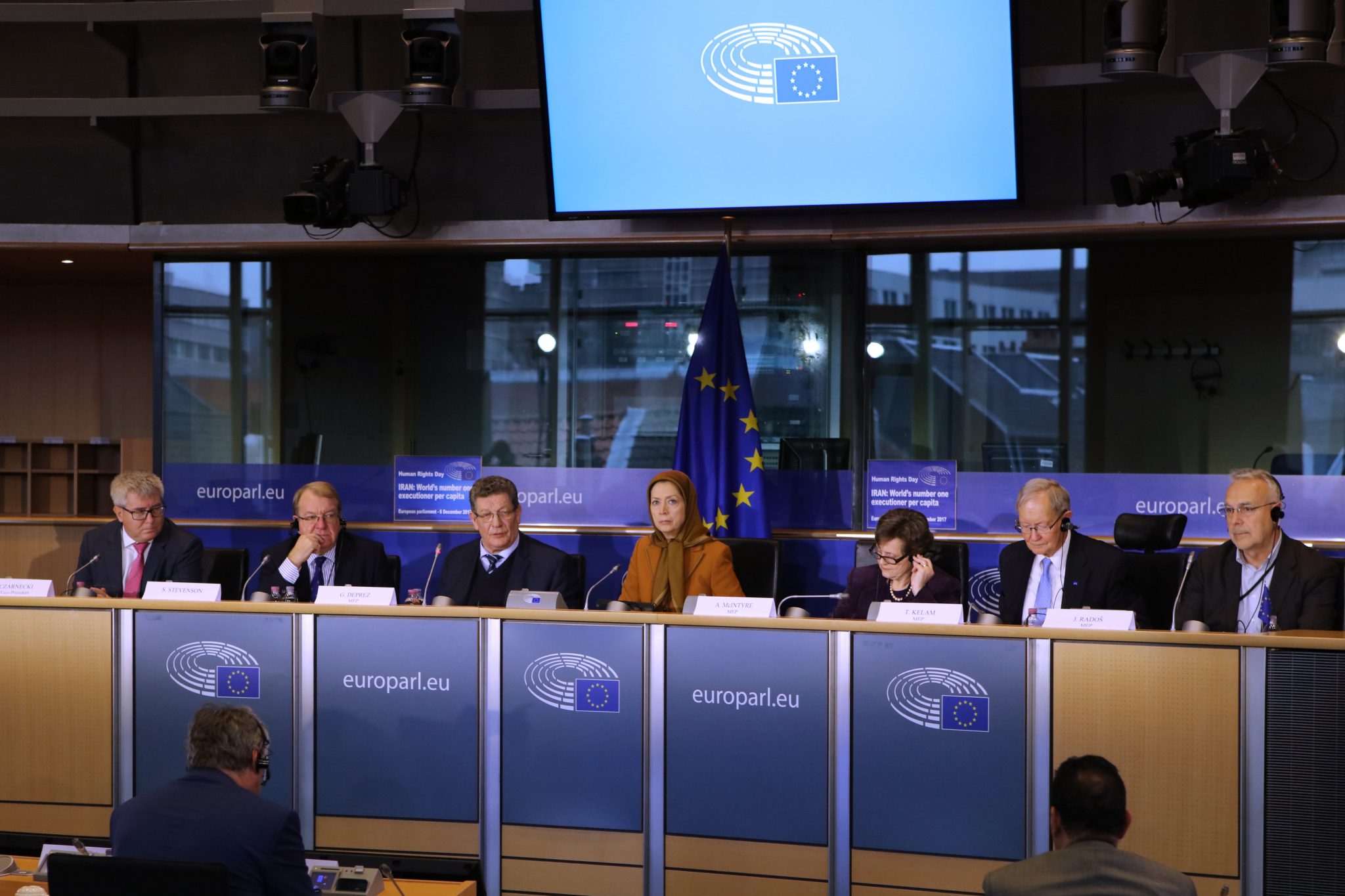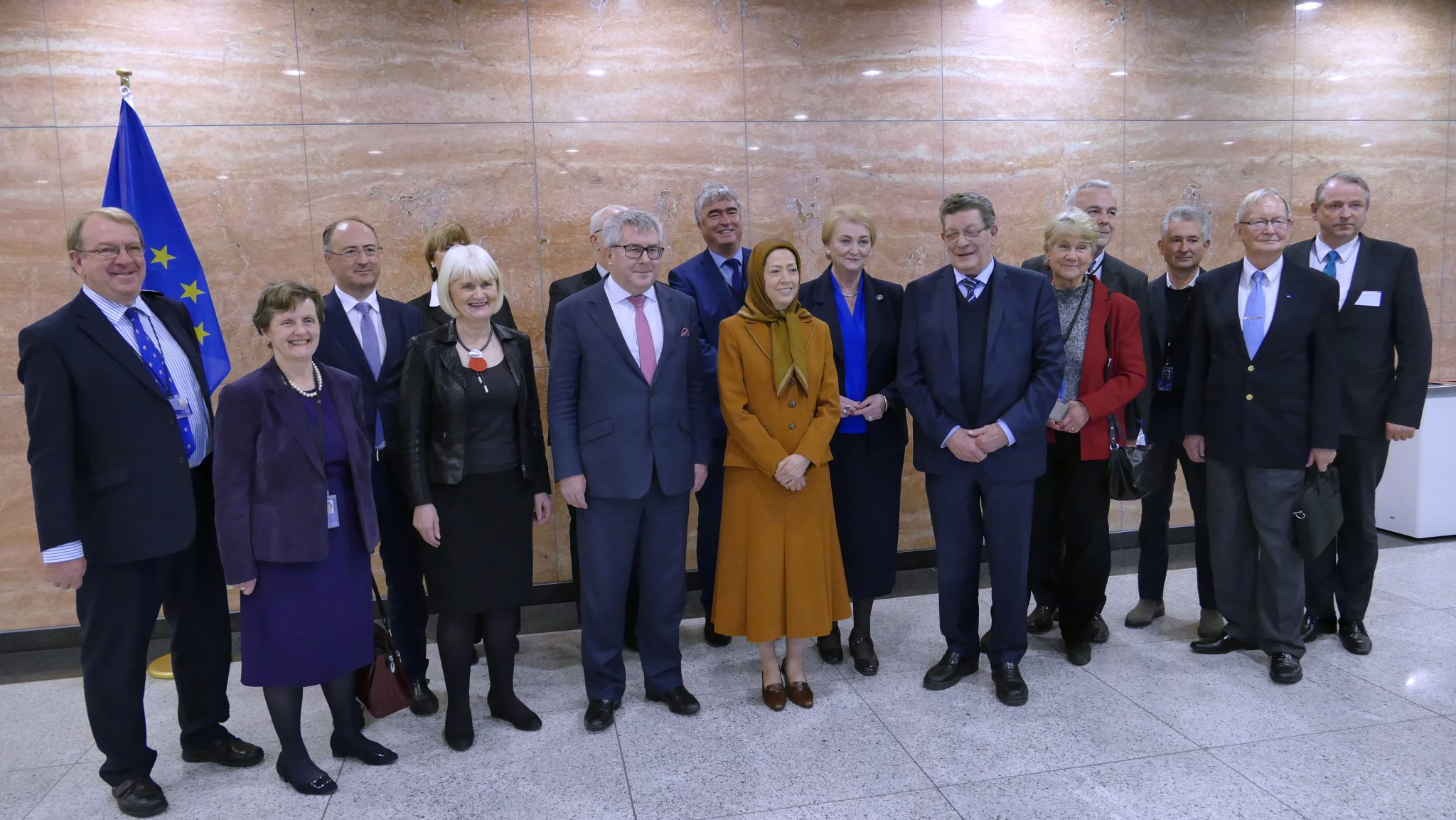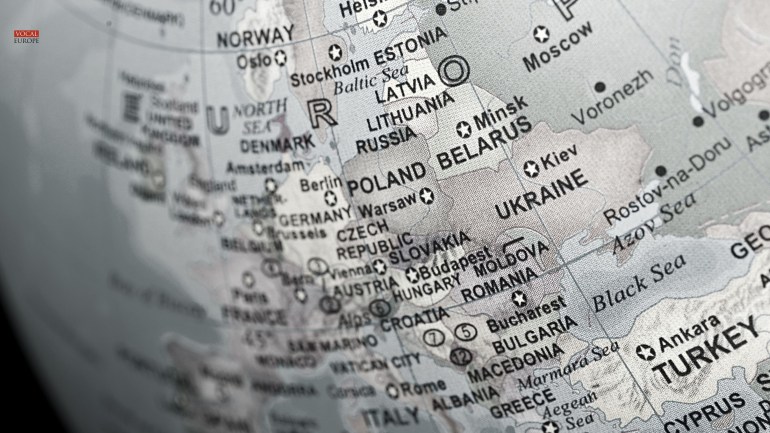
Apolitically diverse group of senior MEPs criticized, in a panel debate held yesterday, the European Union’s current policy on Iran. On the eve of Human Rights Day, they called for a new approach that will put improvement of the human rights situation and specifically an end to executions and torture at the center of any EU’s relation with Tehran.
The MEPs rejected as fanciful the notion of “moderation” by Iranian President Hassan Rouhani, and called for Tehran to be held accountable for its nefarious regional conduct and ballistic missile program.
Gerard Deprez (ALDE, Belgium) and Chairman of Friends of a Free Iran Inter-Parliamentary Group (FOFI) at European Parliament, said that Iran’s human rights violations have gone unanswered for nearly 38 years. He called particular attention to the massacre of over 30,000 political prisoners, mostly from the People’s Mojahedin Organization of Iran (PMOI/MEK), in the summer of 1988. Deprez criticized EU foreign policy chief Federica Mogherini for excessive focus on the 2015 nuclear deal and for encouraging Western companies to go to Iran.

EU must not compromise and must not stay silent on human right, said Ryszard Czarnecki (ECR, Poland) and Vice-President of the European Parliament. In his view, “as long as executions continue in Iran, as long as freedom of speech is repressed in Iran, as long as religious minorities including Christians and Sunni Muslims are repressed in Iran, we cannot and we must not have a normal relation with this regime.”
“In recent years, we were somewhat soft on our principles and values and made compromises that we should not have made”, declared Pavel Telička (ALDE, Czech Republic) and Vice-President of the European Parliament. He stressed that during the EU delegation’s visit to Iran, 18 people were executed: “that was a punch to us and that means that we are collaborators”.
The MEPs expressed their support for the Iranian resistance and Maryam Rajavi, the President-elect of the National Council of Resistance of Iran, the coalition of Iranian democratic opposition movements.
During the meeting, Maryam Rajavi said there are growing signs of the popular desire for regime change in Iran, and the regime’s solution has been more suppression and more executions as well as stepping up its meddling abroad.
She warned that this policy does not reflect the regime’s strength but its deep internal crisis which it tries to cover up by expanding its influence in the region. Indeed, it seeks to put up a hollow show of force to discourage the international community from adopting a decisive and firm policy against it.
According to Maryam Rjavi, as long as the international community fails to hold the Iranian regime accountable for its destructive behavior, the mullahs will carry on with their dangerous adventures.
The Iranian opposition leader said the EU can play a positive role in peace and stability in the Middle East and as such should hold the Iranian regime accountable for its crimes against the people of Iran and particularly for the massacre in 1988. It should demand immediate expulsion of the Iranian Revolutionary Guard Corps and its proxies from Syria and other countries in the region, as well as an immediate halt to the regime’s ballistic missile program. Failure to comply with these demands should result in severe sanctions on the regime’s oil exports and loss of access to the international banking system.
Struan Stevenson, President of the European Iraqi Freedom Association (EIFA), pointed out that EIFA had recently published a 25-page report which details the extensive links between the Iranian regime and Sunni extremist groups like al-Qaeda and Daesh. Stevenson represented Scotland in the European Parliament from 1999 until his retirement in 2014. He also served as President of the Parliament’s Delegation for Relations with Iraq from 2009 to 2014.
“During the Soviet era, communists around the world were divided into a multitude of factions like Marxists, Leninists, Trotskyists and Maoists. They disagreed and fought with each other constantly. But ultimately, they all regarded Moscow as the Godfather of international communism,” the former Conservative MEP said in Wednesday’s meeting.
“The same applies to Islamic fundamentalism today. They are split into a thousand factions, like the Taliban, al-Qaeda, Daesh, Boko Haram, Hezbollah and other terrorist groups and they all fight like cats in a sack. But they all look to Tehran as the Godfather of fundamentalist Islam. Just as the collapse of the Soviet Union saw the virtual end of aggressive communist expansionism, so the collapse of the mullah’s regime will bring an end to the spread of Islamist terror across the globe.”
Stevenson concluded: “For those of us who hold human rights dear, we have to support the Iranian resistance under the leadership of Mrs Maryam Rajavi and the only legitimate democratic opposition movement, the PMOI/NCRI, to liberate the beleaguered Iranian people, who ache and pray for the removal of this corrupt and evil regime and the restoration of human rights, women’s rights, freedom, justice and democracy to their long-suffering nation.”
Next week, the European Parliament will debate a resolution on Iran nuclear deal in Strasbourg plenary.


